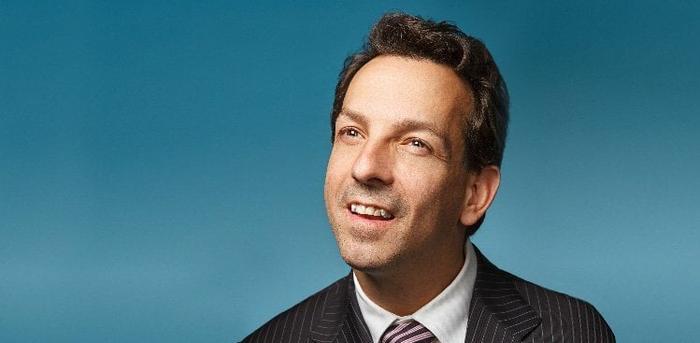
Rich Donovan wanted to be a rocket scientist in high school, which probably would have been a more sensible career for someone with cerebral palsy than the one he ultimately chose. As an engineer studying jet propulsion, Donovan would’ve been able to go about his work at his own pace, a huge plus for anyone managing a disability that affects movement, coordination, and speech.
But before he even enrolled at the prestigious Columbia Business School, Donovan decided he was going to take on one of the most fast-paced, high-intensity jobs in the world, one that places a premium on quick, effective communication. He was going to trade stocks on Wall Street.
“I love the markets,” says Donovan, who is now based in Toronto. “I love the complexities of the markets. It was one of those things that was a challenge to do, but it was the best job in the world, in my mind.”
Looking back on his eight-year career as a portfolio trader at Merrill Lynch—where in 2001 he became the only trader at the time with a visible disability, as far as he knew—Donovan speaks of his career as if it were a foregone conclusion. He wanted to be a trader, so he became one. Yes, people told him it’d probably be best to choose another career, and yes, there would be plenty of challenges, but none of this came close to dissuading him from pursuing his passion.
“At the time it wasn’t necessarily difficult, it was just something that had never been done before,” Donovan remembers. “Frankly, I didn’t even know if I could do it. It was just a mindset of, ‘OK, let’s figure it out as we go.’ I was just a smart guy who wanted to play a role, and needed to figure out how to get that done.”
The biggest hurdle was managing the speed of the market. Traders must handle hundreds of stocks at once while synthesizing numerous data points. As Donovan notes, there’s no way to slow down the market. You have to find a way to keep up or get out of the game. After joining Merrill Lynch, Donovan worked with his colleagues to develop workarounds so that he could communicate with the efficiency the market demanded. Because his voice is sometimes difficult to understand, he relied on instant messaging services and email when dealing with other traders. Eventually, they got used to his voice and he could communicate over the phone.
“The key is that you go in with an honest mindset,” he says about getting his footing. “You say, ‘OK, there are unknowns here. The potential gains outweigh the potential risks, so let’s wade into this and see what happens.’ If one avenue wasn’t possible, there were a dozen other avenues to go down.”
Working to Donovan’s advantage was that it typically takes any trader six to eight months before they’re able to move stocks at speeds that would be demanding for someone with cerebral palsy. This gave him ample time to ease his way into the job and develop a communication system. It didn’t take him long at all to feel certain he’d adapt to the fast-paced environment. “For me, it was maybe two weeks,” he says. “It was obvious to me that I could do this.”
In 2006, Donovan founded Lime Connect, a nonprofit aimed at jump-starting the careers of promising individuals with different kinds of disabilities. After leaving Merrill Lynch in 2008, Donovan took his advocacy to the corporate level by founding The Return on Disability Group, an advisory and investment group that analyzes how companies can profit by catering to people with disabilities, a market the corporate world has traditionally considered a hindrance to their bottom line.
“Companies are now making products that are easier to use, building environments that are easier to access, and using disability functionality to drive the customer experience,” says Donovan, who highlights Google as the best example of a company profiting from designing intuitive products that take into account consumers with physical limitations. “That wasn’t thought of when I started at Merrill Lynch.”
Corporate America has made exponential progress in embracing the disability market since Donovan first taught himself how to trade stocks. For him, the most exciting innovation on the horizon may be the self-driving car, which would revolutionize how people with disabilities interact with the world. Not surprisingly, The Return on Disability Group’s number-one-ranked company, Google, is hot on the case. “You can almost hear the engineer say to his team, ‘Listen, I want you to go build me a car a blind guy can drive,’” Donovan says. “That’s exactly what they did.”
When Donovan graduated from business school, he had to adapt to the corporate landscape. Two decades later, he’s busy teaching corporations how to adapt to him.
The Biggest Challenge He Faced
Probably just getting into a good [school]. Once I got into Columbia Business School that solved that problem. When you go to a major business school you have access to all the firms, and then you can just sell yourself.
Advice He’d Give Another First or Only
Don’t be afraid of sacrifices. You’re going to have to make lots of sacrifices to get there, and that’s just the way it has to be. Nobody is going to give it to you unless you’re the best and you’re ready to go further than anyone else. That means giving up certain things that you won’t be able to do.
What He Wishes People Had Known
Just relax. I was an easygoing guy and I wasn’t going to take offense at certain things. Don’t worry so much about my feelings. I know what’s going on. I'm a big boy. I can deal with it. If it works it works and if it doesn’t it doesn’t. That’s the real world.
This article has been updated to clarify that Rich Donovan was a portfolio trader, not a broker.